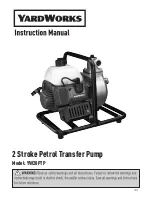
9
undersized cord will cause a drop in line voltage
resulting in loss of power and overheating.
Use Table 1 as a general guide in choosing the
correct size cord. If in doubt, use the next heavier
gauge. The smaller the gauge number, the heavier
the cord.
Recommended Gauges (AWG) of Extension
Cords
Amps
Extension Cord Length *
25
feet
50
feet
75
feet
100
feet
150
feet
200
feet
< 5
16
16
16 14 12
12
5 to 8
16
16 14 12 10
NR
8 to 12 14 14 12 10 NR
NR
12 to 15
12
12 10 10 NR
NR
15 to 20
10
10
10
NR
NR
NR
21 to 30
10
NR
NR
NR
NR
NR
*based on limiting the line voltage drop to 5V at 150%
of the rated amperes.
NR: Not Recommended.
Table 1
8.0
Adjustments
Numbers in parentheses refer to Figure 1.
8.1
Belt tracking
1. Open side panel (13) and spin drive wheel (11)
by hand to check preliminary tracking.
2. Use tracking knob (7) to correct until belt runs
centered on wheels. Clockwise knob rotation
shifts belt toward the left; counterclockwise
toward the right, as viewed from the contact
wheel end.
3. Close side panel (13).
4. Connect machine to power and turn on to
check final tracking. Adjust as needed with
knob.
Do not operate machine with
side panel open.
8.2
Belt change
1. Disconnect machine from power.
2. Allow belt to completely stop, then remove
spark trap (1).
3. Open side cover, and slacken belt by pushing
tension release lever (8) downward
(counterclockwise).
4. Install new belt according to direction arrows
printed on belt.
5. Move tension release lever (8) upward
(clockwise) to tighten belt.
6. Close side cover and reinstall spark trap (1).
8.3
Belt tension adjustment
Belt tension has been adjusted by the
manufacturer. If future adjustment is needed,
distance between the wheels can be changed
using the two hex nuts (17).
9.0
Operation
9.1
Contact grinding
The operator faces the contact wheel (4) and holds
the work piece with both hands.
Note: Keep hands
away from contact area, which will grow warm
during operation.
The work piece is pushed against belt, and rested
upon front work support (3) if needed.
9.2
Surface grinding
The operator faces the open belt guard (6) during
surface grinding. The work piece is held with both
hands and pushed hard against the top work
support (5).
10.0
Maintenance
Before doing maintenance on
the machine, disconnect it from the electrical
supply by pulling out the plug or switching off
the main switch! Failure to comply may cause
serious injury.
Ball bearings have been packed with grease and
sealed, and require no further lubrication.
Frequent cleaning is mandatory to ensure best
operation and extended life of the belt grinder.
If graphite layer becomes damaged, replace it.
Use a brush to remove swarf from the wheels and
interior.
Check belt periodically for cuts, frays, or worn
areas. Replace belt when these symptoms are
found.
Empty spark trap frequently.
If power cord is worn, cut, or damaged in any way,
have it replaced immediately.


































